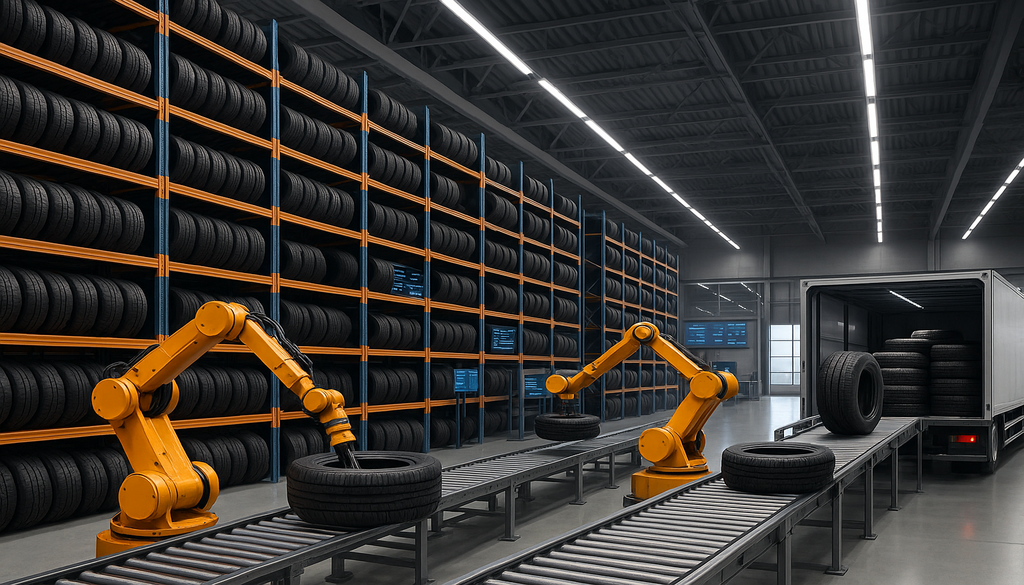In today’s competitive manufacturing landscape, optimizing shop floor production control is essential for achieving better efficiency and maximizing productivity. By effectively managing and controlling the manufacturing process, companies can streamline operations, reduce costs, and improve overall performance. This comprehensive guide will delve into the various aspects of shop floor production control, highlighting the importance of efficiency and exploring strategies for optimization. Additionally, we will discuss the role of technology in this field and how it is transforming shop floor production control for the better.
Understanding Shop Floor Production Control
Before diving into the optimization strategies, it is crucial to have a clear understanding of shop floor production control and its basic principles. At its core, shop floor production control focuses on managing and coordinating the production activities happening on the shop floor. By effectively utilizing available resources, such as labor, machines, and materials, companies can ensure a smooth and efficient workflow.
The Basics of Shop Floor Production Control
Shop floor production control involves planning, organizing, and controlling manufacturing operations to meet production targets and deliver products on time. It encompasses various activities, including production scheduling, inventory management, quality control, and machine maintenance. A well-implemented production control system ensures that all resources are optimized and utilized efficiently, minimizing waste and maximizing productivity.
The Role of Shop Floor Production Control in Manufacturing
Shop floor production control plays a vital role in the overall manufacturing process. It serves as the driving force behind efficient operations, ensuring that production activities run smoothly and effectively. By overseeing and coordinating every aspect of the shop floor, production control teams can minimize disruptions, reduce downtime, and eliminate bottlenecks, ultimately improving the overall efficiency of the manufacturing process.
Key Components of Shop Floor Production Control
Effective shop floor production control relies on several key components, each contributing to the overall efficiency of the manufacturing process.
- Production Planning: Proper planning involves setting production goals, analyzing demand forecasts, and determining the required resources and timelines for each production task.
- Production Scheduling: Once the production plan is established, scheduling involves allocating resources, such as labor, machines, and materials, to specific tasks and determining their sequence.
- Inventory Management: Efficient management of inventory ensures that the right materials are available when needed, minimizing delays and reducing excess stock.
- Quality Control: Implementing quality control measures throughout the production process ensures that products meet the required standards, reducing the risk of defects and reworks.
- Machine Maintenance: Regular maintenance and monitoring of machines help prevent unexpected breakdowns, ensuring uninterrupted production.
Furthermore, shop floor production control also involves effective communication and collaboration between different departments within a manufacturing organization. This includes close coordination between the production control team, procurement team, and the various production departments. By maintaining open lines of communication and sharing relevant information, potential issues can be identified and addressed proactively, minimizing disruptions and ensuring a seamless production process.
Additionally, continuous improvement is a fundamental aspect of shop floor production control. By regularly analyzing production data, identifying areas for improvement, and implementing appropriate changes, companies can enhance their production processes and achieve higher levels of efficiency. This may involve implementing new technologies, adopting lean manufacturing principles, or training employees on new techniques and best practices.
The Importance of Efficiency in Shop Floor Production
Efficiency is a critical metric for measuring the success of shop floor production control. An efficient production process translates to increased output, reduced costs, and improved customer satisfaction. Let’s explore the impact of efficiency on production outcomes and the common challenges manufacturers face when striving for optimal efficiency.
Efficient shop floor production control directly contributes to positive production outcomes. By improving workflow and minimizing waste, companies can increase their production capacity, reduce lead times, and meet customer demands more effectively. Moreover, enhanced efficiency leads to cost savings by reducing overtime, idle time, and material waste.
Measuring efficiency requires the use of key performance indicators (KPIs) to assess various aspects of the manufacturing process. Common KPIs include overall equipment effectiveness (OEE), which measures the percentage of planned production time that is truly productive, and cycle time, which measures the time taken to complete a specific production task. By regularly monitoring these metrics, manufacturers can identify areas for improvement and implement targeted strategies to optimize efficiency.
Despite the importance of efficiency, manufacturers often face challenges when trying to achieve optimal productivity on the shop floor.
- Workforce Management: Managing and coordinating a diverse workforce with varying skill levels can be challenging. Ensuring that workers are trained adequately and possess the necessary skills is crucial for maintaining efficiency.
- Supply Chain Coordination: Coordinating the supply chain, including suppliers, vendors, and logistics, is vital for minimizing disruptions and ensuring timely availability of materials.
- Production Bottlenecks: Identifying and addressing bottlenecks in the production process is essential for preventing delays and improving overall efficiency.
Workforce management is a multifaceted task that requires careful planning and coordination. Manufacturers must consider factors such as employee training, skill development programs, and effective communication channels to ensure that the workforce operates at its full potential. By investing in training programs and providing ongoing support, companies can empower their employees to perform at their best, ultimately contributing to improved efficiency on the shop floor.
Supply chain coordination is another critical aspect of achieving efficiency in shop floor production. Manufacturers must establish strong relationships with suppliers and vendors to ensure a smooth flow of materials and minimize disruptions. Implementing robust inventory management systems and leveraging technology can help streamline the supply chain, enabling manufacturers to respond quickly to changes in demand and avoid costly delays.
Strategies for Optimizing Shop Floor Production Control
To achieve optimal efficiency and streamline shop floor production control, companies can implement various strategies and best practices. Let’s explore some of these strategies:
Efficient shop floor production control is crucial for companies looking to stay competitive in today’s fast-paced market. By implementing innovative strategies and leveraging cutting-edge technologies, businesses can enhance their operational efficiency and drive sustainable growth.
Implementing Lean Manufacturing Principles
Lean manufacturing principles, such as just-in-time (JIT) inventory management and waste reduction, can greatly enhance shop floor production control. By eliminating waste, optimizing workflows, and continuously improving processes, companies can achieve higher efficiency and reduce costs.
Furthermore, embracing a culture of continuous improvement and empowering employees to contribute ideas for process enhancement can foster a more agile and responsive production environment.
Utilizing Advanced Production Control Software
Adopting advanced production control software can revolutionize shop floor operations. These software solutions provide real-time visibility into production data, enabling accurate planning, scheduling, and monitoring. Automated alerts and notifications can help identify and address issues promptly, ensuring efficient and uninterrupted production.
Moreover, integrating production control software with other enterprise systems, such as inventory management and supply chain solutions, can create a seamless flow of information across the organization, enabling better decision-making and resource allocation.
Streamlining Workflow for Better Efficiency
Analyze the production workflow and identify areas where improvements can be made. This may involve reorganizing workstations, optimizing work schedules, or implementing interdepartmental communication protocols. Streamlining the workflow can eliminate unnecessary steps, reduce bottlenecks, and improve overall efficiency.
Additionally, fostering collaboration between different departments and cross-training employees can enhance flexibility and agility in responding to changing production demands, ultimately leading to a more adaptive and efficient shop floor environment.
The Role of Technology in Shop Floor Production Control
Technology plays a crucial role in modernizing shop floor production control and driving efficiency. Let’s explore two significant technological advancements in this field:
The Rise of Automation in Shop Floor Production
Automation has revolutionized shop floor production, enabling companies to achieve higher levels of efficiency and productivity. Automated machines and robotics can perform repetitive tasks with precision, minimizing errors and improving cycle times. By integrating automation into shop floor production control, manufacturers can optimize resource allocation and enhance overall efficiency.
Imagine a shop floor bustling with activity, where machines hum with synchronized precision. Thanks to automation, the production process flows seamlessly, with minimal human intervention. This not only reduces the risk of human error but also allows workers to focus on more complex tasks that require creativity and problem-solving skills. With the repetitive tasks taken care of by automated systems, employees can dedicate their time to innovation and process improvement, driving the company forward.
How IoT is Transforming Shop Floor Production Control
The Internet of Things (IoT) has opened up unprecedented possibilities for shop floor production control. IoT devices and sensors capture real-time data, providing valuable insights into machine performance, energy consumption, and production metrics. This data can be leveraged to optimize production processes, reduce downtime, and enhance overall efficiency.
Picture a shop floor where every machine is equipped with sensors that monitor its performance and health. These sensors continuously collect data on various parameters, such as temperature, pressure, and vibration. This real-time data is then transmitted to a central control system, where it is analyzed and used to make informed decisions. By monitoring machine performance, manufacturers can proactively identify potential issues and schedule maintenance before a breakdown occurs, minimizing downtime and maximizing productivity.
The Future of Shop Floor Production Control: AI and Machine Learning
Artificial intelligence (AI) and machine learning algorithms are poised to revolutionize shop floor production control in the near future. These technologies can analyze vast amounts of data, identify patterns, and make predictive forecasts. By leveraging AI and machine learning, manufacturers can optimize production planning, predict maintenance requirements, and further enhance overall efficiency.
Imagine a shop floor where machines not only perform their tasks but also learn and improve over time. AI algorithms analyze historical data and identify patterns that humans might miss. This allows for more accurate demand forecasting, optimized production schedules, and proactive maintenance planning. By harnessing the power of AI and machine learning, manufacturers can stay one step ahead, anticipating challenges and continuously improving their production processes.
In conclusion, optimizing shop floor production control is crucial for achieving better efficiency and maximizing productivity. By understanding the basics of production control, recognizing the importance of efficiency, and implementing effective strategies, manufacturers can streamline operations and improve overall performance. Embracing technological advancements, such as automation, IoT, AI, and machine learning, further enhances efficiency and propels shop floor production control into the future.







